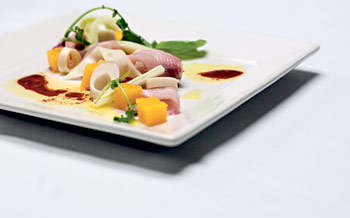 t’s not often that a culinary student in Kalispell has the opportunity to learn from a world-renowned chef whose boss just happens to be an internationally known television star. But that’s exactly what happened last week at Flathead Valley Community College’s Culinary Institute of Montana when Executive Chef Nai Kang Kuan paid a visit.
t’s not often that a culinary student in Kalispell has the opportunity to learn from a world-renowned chef whose boss just happens to be an internationally known television star. But that’s exactly what happened last week at Flathead Valley Community College’s Culinary Institute of Montana when Executive Chef Nai Kang Kuan paid a visit.
While you may not recognize Chef Kang’s name, you’re probably familiar with his boss, Japanese Chef Masaharu Morimoto, who is a regular on Iron Chef and Iron Chef America. Kang is the executive chef at Morimoto Napa and was in the Flathead last week preparing a special dinner and conducting demonstrations for FVCC students. The Beacon caught up with the chef to talk about the local food movement and advice for up-and-coming cooks.
Beacon: How did you meet Morimoto and how did you become the executive chef for Morimoto Napa in California?
Kang: Before working for Morimoto I was at French Laundry in Yountville, Calif. for five years, where I was a sous-chef. When they opened Morimoto Napa, the opening executive chef was looking for a replacement and I was tapped because I was an acquaintance and worked at a prestigious place. I’m the executive chef for the restaurant and I’m also the general-purpose guy for Morimoto, so I do all food events for him and I’m on the opening team for new Morimoto restaurants, including ones opening this year in South Beach, Chicago and Las Vegas.
Beacon: Your formal training is in French techniques, but you also have insights in East Asian cuisine. What type of cultures and food influence you?
Kang: I’m Chinese, so I use a lot of Asian flavors in my food, but my stepfather is Italian, so my first meal in the United States was baklava with red sauce, raisins and olives. I’ve also worked at Swedish and Italian restaurants, so I’ve got a diverse background, but overall, I cook what tastes good. Culturally I’m not limited to one cuisine or culture. In every culture there are foods that show well and foods that don’t show well; there are certain dishes that are world-renowned because they are accepted and appreciated by all food cultures and I’m all about those flavors. There is also a lot of commonality in different cuisines. A lot of people talk about how everything is different, but in reality it’s one big flavor, it’s one Earth, it’s one world flavor.
 |
|
Photo by Greg Lindstrom | Flathead Beacon |
Beacon: A lot of people in Northwest Montana are interested in the local food movement; is that important to you and your cooking?
Kang: I find it really interesting that we used to eat local because of transportation. The ability to move food and keep it fresh was limited at one time, but then in the 1950s we had the ability to ship food. But when gas prices spiked, everyone started eating local again because the cost of transportation went up. Is it big in my cooking? Absolutely, but I’m also spoiled because I’m in California. But it’s not just about produce and meat, it’s about trying to make most things in-house and in your kitchen, to try and get away from industrial produced ingredients.
Beacon: What advice do you have for up-and-coming cooks or even just people cooking at home?
Kang: I always tell young cooks to think like a fat guy and be organized. Here’s why: Because the fat guy will not get up four times during the Super Bowl halftime show to get a sandwich, to go to the bathroom, to change into his pajamas and pet the dog. He’ll do that all in one trip. The fat guy is the most organized guy in the kitchen because he gets the most done with the least amount of effort, that’s why he’s fat. But the more you’re like that guy the more you can do because you know how to manage your time and organize yourself.